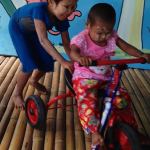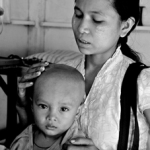Medical services in a city of extremes -printed with permission of Mike Kear
Medical Action Myanmar provide vital medical services to some of the poorest suburbs on the outskirts of Yangon. Services range from sexual and reproductive health, HIV testing and treatment, to treatment of malaria and tuberculosis (TB), all packed into four small but very efficient and effective clinics. The original and largest clinic in Hlaing Tha Yar township, which has been operational since 1994 and originally set up by Médecins Sans Frontières (MSF), serves a population of about 400,000 people and they typically see 300 clients a day.
What struck me most was the many pragmatic and common sense approaches they took to looking at the patient in the broadest sense. The efficacy of treating HIV is restricted if the patient is lacking in basic nutrition, as is so often the case in clients who discover they are HIV positive at the clinic. The clinic has a feeding centre which provides a balanced diet for a six month period for malnourished children. The centre is a fun place for the children to play and be monitored, thereby making feeding a more positive experience. MAM also provide what is called “Dry Rations” to patients on ART or TB medication that have dietary needs.
Health care in Yangon is generally regarded as poor with less that 0.5% of national budget spent on it. Yangon is growing at a rapid rate and accommodation in downtown Yangon is some of the most expensive in SE Asia, partly as a result of supply not meeting the demand from foreigners working for NGO’s and large companies with the resulting knock on effect to locals. There is severe economic hardship in the suburbs surrounding Yangon that the clinics serve. MAM provide assistance with transport fees for some HIV  positive patients to ensure they can attend clinic regularly.child in for treatment.
positive patients to ensure they can attend clinic regularly.child in for treatment.
The clinic has an outreach programme to encourage sex workers to attend the clinic for regular screenings for STIs including HIV. This includes a dedicated waiting area which is comfortably set up with coffee and noodles are served. This makes for a positive experience for anyone attending and provides a space to relax, chill out and share time with each other. The aim is to “make it their home” so they visit regularly, ideally every month. They have a trained peer educator who used to be a sex worker and she overseas the outreach programme. This also includes making a payment to women who recruit new patients and bring them to the clinic.
The clinic provides TB services, but unfortunately the government won’t allow patients to stay over night as it is not a hospital, so all patients have to go home. MAM now has a separate patient house for those that have to travel a long way to the clinic.

Comments